Corporation Law: Insolvent Trading and Director's Duties
VerifiedAdded on 2021/06/17
|6
|1030
|65
Case Study
AI Summary
This case study analyzes two issues related to corporation law. The first issue concerns the potential civil and criminal liabilities of directors Liam and Peta for insolvent trading. The company, facing insolvency, continued to transact under their instructions, incurring unpaid tax liabilities and failing to pay creditors. The analysis considers the provisions of the Corporations Act 2001, particularly sections 588G, 588K, and 95A, to determine the directors' breaches of duty and the penalties ASIC could impose. The second issue examines whether Alexandra can be legally pursued for her company's contract and her use of a client list obtained from her previous role. The analysis applies Section 183 of the Corporations Act 2001 to assess whether she breached her statutory duties by using the client list for her own company's benefit. The conclusion outlines the potential legal actions and liabilities for each individual based on the facts and relevant legislation.
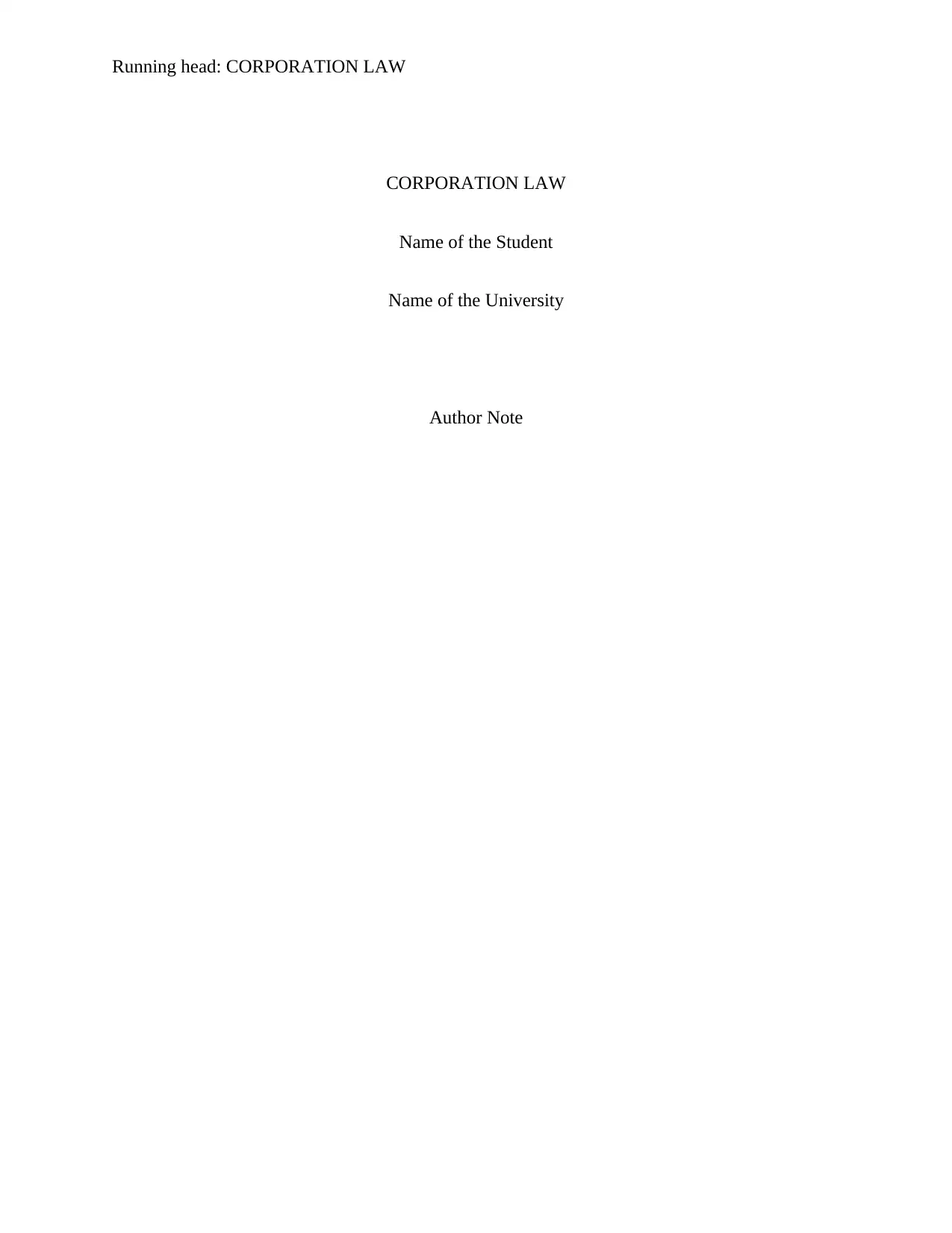
Running head: CORPORATION LAW
CORPORATION LAW
Name of the Student
Name of the University
Author Note
CORPORATION LAW
Name of the Student
Name of the University
Author Note
Paraphrase This Document
Need a fresh take? Get an instant paraphrase of this document with our AI Paraphraser
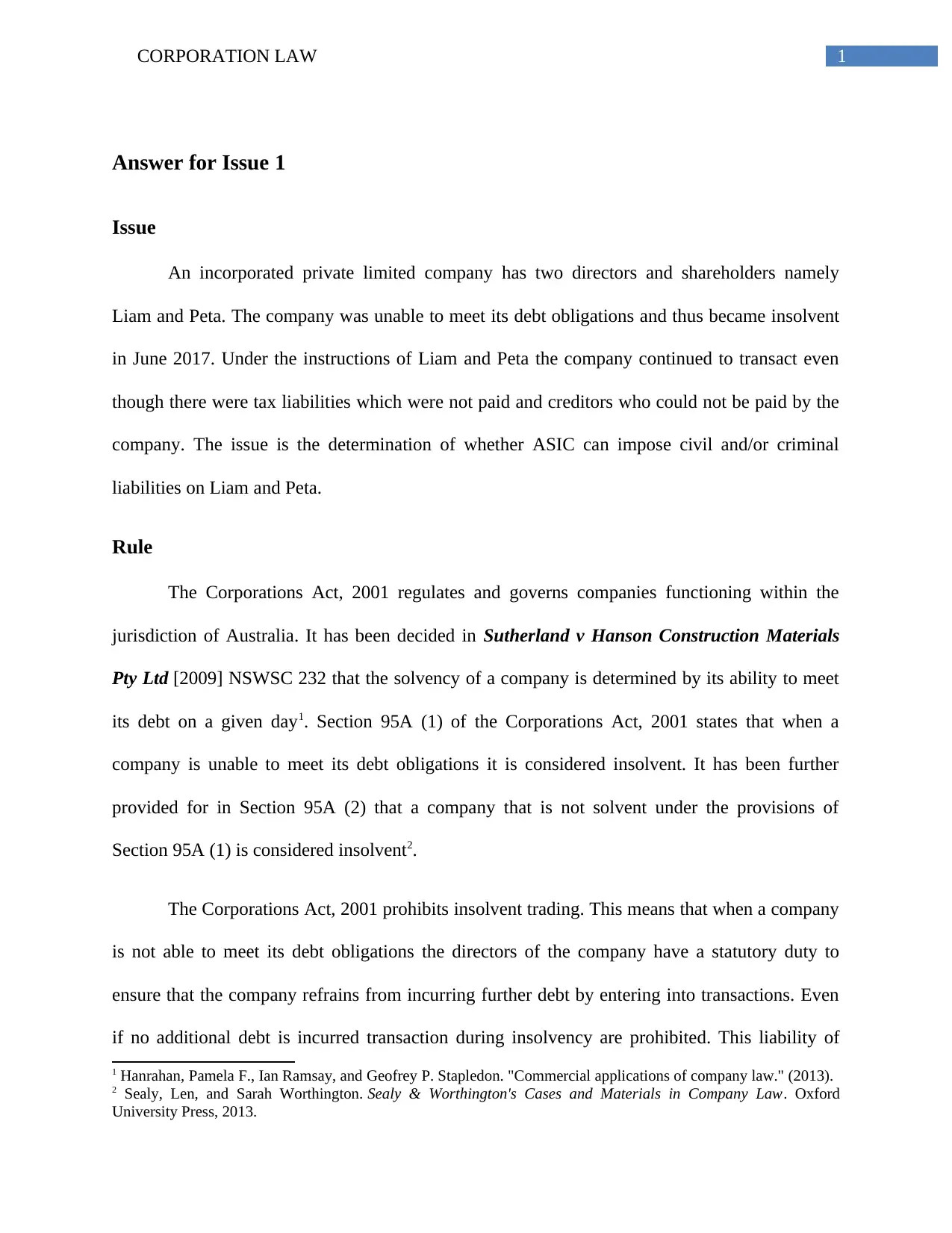
1CORPORATION LAW
Answer for Issue 1
Issue
An incorporated private limited company has two directors and shareholders namely
Liam and Peta. The company was unable to meet its debt obligations and thus became insolvent
in June 2017. Under the instructions of Liam and Peta the company continued to transact even
though there were tax liabilities which were not paid and creditors who could not be paid by the
company. The issue is the determination of whether ASIC can impose civil and/or criminal
liabilities on Liam and Peta.
Rule
The Corporations Act, 2001 regulates and governs companies functioning within the
jurisdiction of Australia. It has been decided in Sutherland v Hanson Construction Materials
Pty Ltd [2009] NSWSC 232 that the solvency of a company is determined by its ability to meet
its debt on a given day1. Section 95A (1) of the Corporations Act, 2001 states that when a
company is unable to meet its debt obligations it is considered insolvent. It has been further
provided for in Section 95A (2) that a company that is not solvent under the provisions of
Section 95A (1) is considered insolvent2.
The Corporations Act, 2001 prohibits insolvent trading. This means that when a company
is not able to meet its debt obligations the directors of the company have a statutory duty to
ensure that the company refrains from incurring further debt by entering into transactions. Even
if no additional debt is incurred transaction during insolvency are prohibited. This liability of
1 Hanrahan, Pamela F., Ian Ramsay, and Geofrey P. Stapledon. "Commercial applications of company law." (2013).
2 Sealy, Len, and Sarah Worthington. Sealy & Worthington's Cases and Materials in Company Law. Oxford
University Press, 2013.
Answer for Issue 1
Issue
An incorporated private limited company has two directors and shareholders namely
Liam and Peta. The company was unable to meet its debt obligations and thus became insolvent
in June 2017. Under the instructions of Liam and Peta the company continued to transact even
though there were tax liabilities which were not paid and creditors who could not be paid by the
company. The issue is the determination of whether ASIC can impose civil and/or criminal
liabilities on Liam and Peta.
Rule
The Corporations Act, 2001 regulates and governs companies functioning within the
jurisdiction of Australia. It has been decided in Sutherland v Hanson Construction Materials
Pty Ltd [2009] NSWSC 232 that the solvency of a company is determined by its ability to meet
its debt on a given day1. Section 95A (1) of the Corporations Act, 2001 states that when a
company is unable to meet its debt obligations it is considered insolvent. It has been further
provided for in Section 95A (2) that a company that is not solvent under the provisions of
Section 95A (1) is considered insolvent2.
The Corporations Act, 2001 prohibits insolvent trading. This means that when a company
is not able to meet its debt obligations the directors of the company have a statutory duty to
ensure that the company refrains from incurring further debt by entering into transactions. Even
if no additional debt is incurred transaction during insolvency are prohibited. This liability of
1 Hanrahan, Pamela F., Ian Ramsay, and Geofrey P. Stapledon. "Commercial applications of company law." (2013).
2 Sealy, Len, and Sarah Worthington. Sealy & Worthington's Cases and Materials in Company Law. Oxford
University Press, 2013.
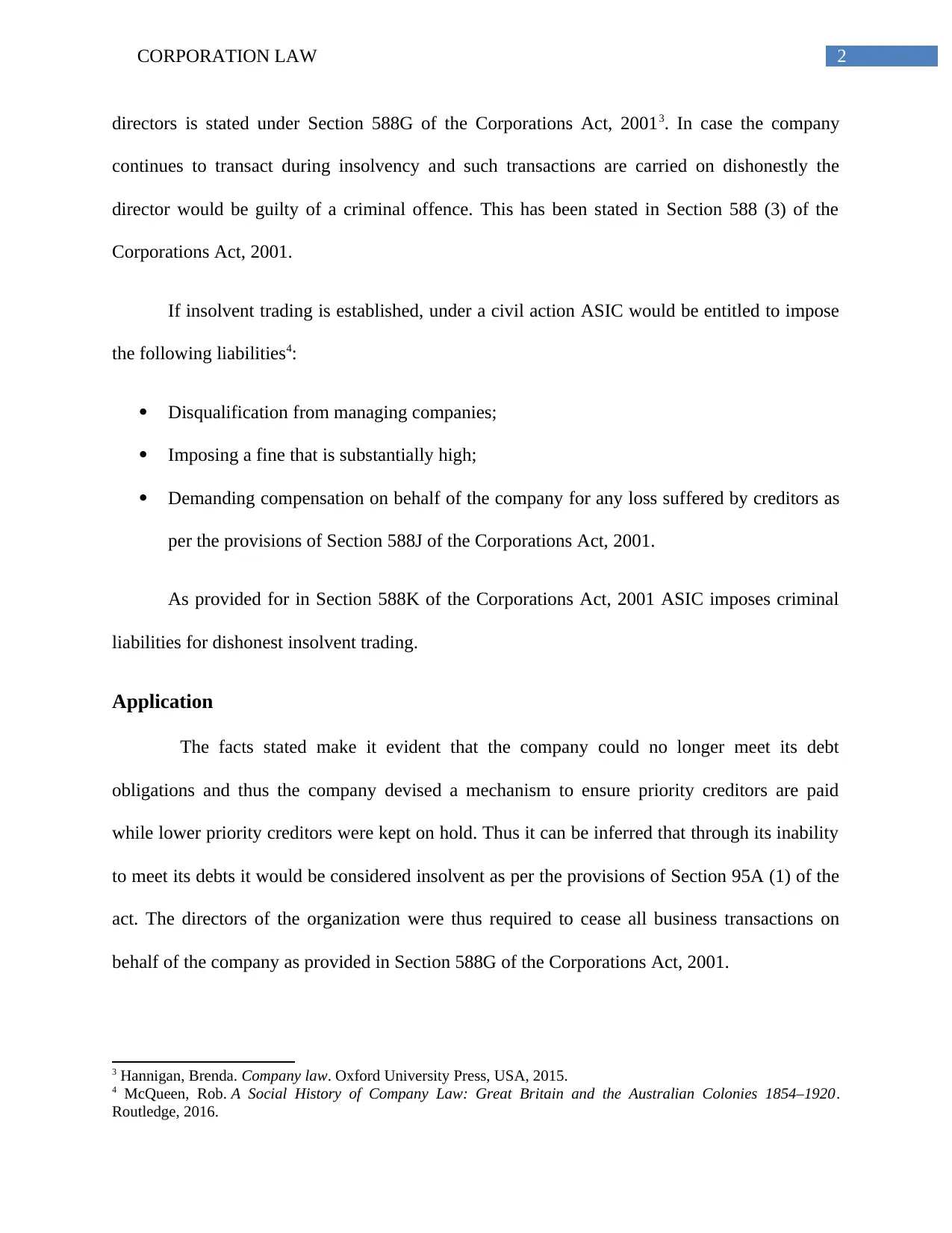
2CORPORATION LAW
directors is stated under Section 588G of the Corporations Act, 20013. In case the company
continues to transact during insolvency and such transactions are carried on dishonestly the
director would be guilty of a criminal offence. This has been stated in Section 588 (3) of the
Corporations Act, 2001.
If insolvent trading is established, under a civil action ASIC would be entitled to impose
the following liabilities4:
Disqualification from managing companies;
Imposing a fine that is substantially high;
Demanding compensation on behalf of the company for any loss suffered by creditors as
per the provisions of Section 588J of the Corporations Act, 2001.
As provided for in Section 588K of the Corporations Act, 2001 ASIC imposes criminal
liabilities for dishonest insolvent trading.
Application
The facts stated make it evident that the company could no longer meet its debt
obligations and thus the company devised a mechanism to ensure priority creditors are paid
while lower priority creditors were kept on hold. Thus it can be inferred that through its inability
to meet its debts it would be considered insolvent as per the provisions of Section 95A (1) of the
act. The directors of the organization were thus required to cease all business transactions on
behalf of the company as provided in Section 588G of the Corporations Act, 2001.
3 Hannigan, Brenda. Company law. Oxford University Press, USA, 2015.
4 McQueen, Rob. A Social History of Company Law: Great Britain and the Australian Colonies 1854–1920.
Routledge, 2016.
directors is stated under Section 588G of the Corporations Act, 20013. In case the company
continues to transact during insolvency and such transactions are carried on dishonestly the
director would be guilty of a criminal offence. This has been stated in Section 588 (3) of the
Corporations Act, 2001.
If insolvent trading is established, under a civil action ASIC would be entitled to impose
the following liabilities4:
Disqualification from managing companies;
Imposing a fine that is substantially high;
Demanding compensation on behalf of the company for any loss suffered by creditors as
per the provisions of Section 588J of the Corporations Act, 2001.
As provided for in Section 588K of the Corporations Act, 2001 ASIC imposes criminal
liabilities for dishonest insolvent trading.
Application
The facts stated make it evident that the company could no longer meet its debt
obligations and thus the company devised a mechanism to ensure priority creditors are paid
while lower priority creditors were kept on hold. Thus it can be inferred that through its inability
to meet its debts it would be considered insolvent as per the provisions of Section 95A (1) of the
act. The directors of the organization were thus required to cease all business transactions on
behalf of the company as provided in Section 588G of the Corporations Act, 2001.
3 Hannigan, Brenda. Company law. Oxford University Press, USA, 2015.
4 McQueen, Rob. A Social History of Company Law: Great Britain and the Australian Colonies 1854–1920.
Routledge, 2016.
⊘ This is a preview!⊘
Do you want full access?
Subscribe today to unlock all pages.

Trusted by 1+ million students worldwide
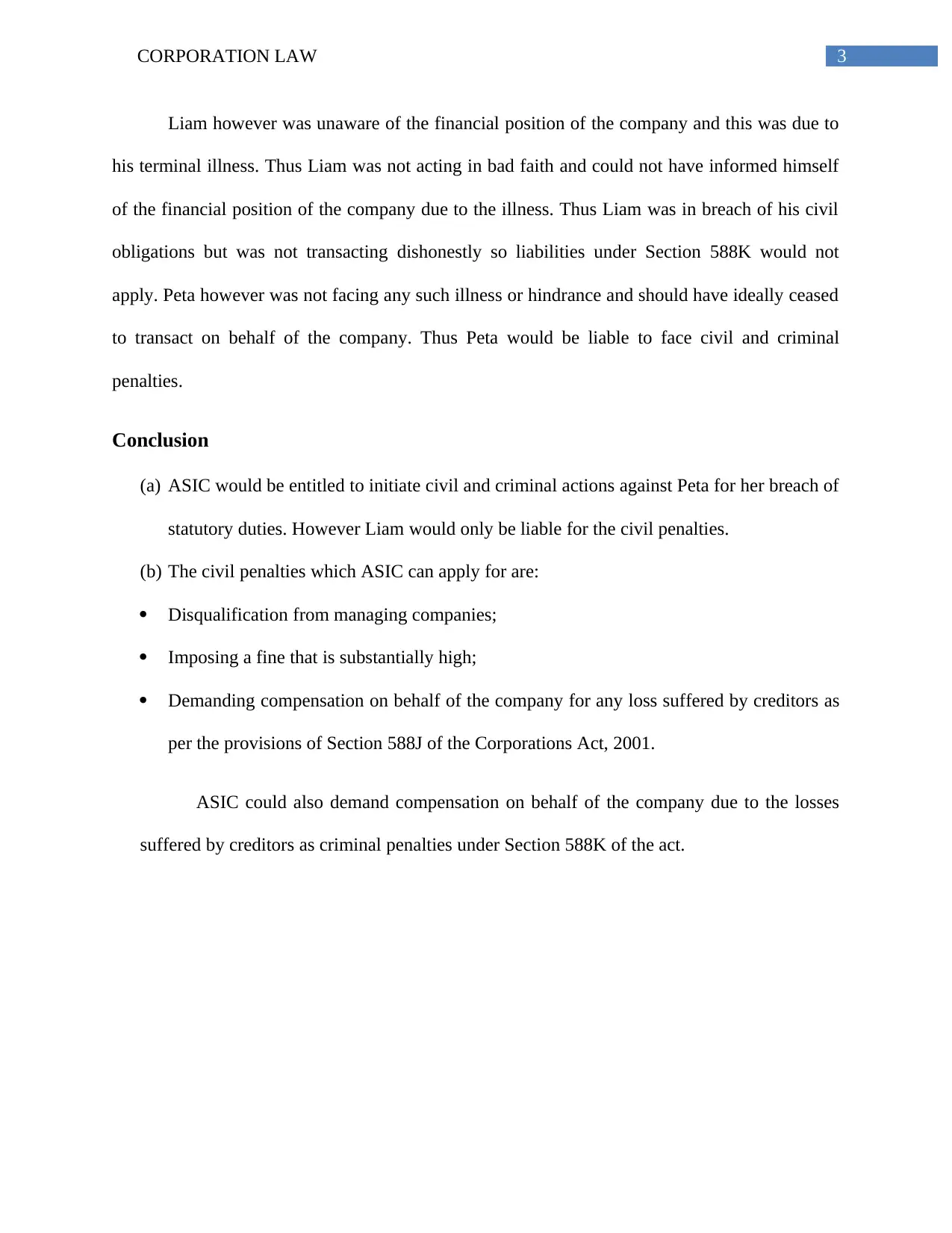
3CORPORATION LAW
Liam however was unaware of the financial position of the company and this was due to
his terminal illness. Thus Liam was not acting in bad faith and could not have informed himself
of the financial position of the company due to the illness. Thus Liam was in breach of his civil
obligations but was not transacting dishonestly so liabilities under Section 588K would not
apply. Peta however was not facing any such illness or hindrance and should have ideally ceased
to transact on behalf of the company. Thus Peta would be liable to face civil and criminal
penalties.
Conclusion
(a) ASIC would be entitled to initiate civil and criminal actions against Peta for her breach of
statutory duties. However Liam would only be liable for the civil penalties.
(b) The civil penalties which ASIC can apply for are:
Disqualification from managing companies;
Imposing a fine that is substantially high;
Demanding compensation on behalf of the company for any loss suffered by creditors as
per the provisions of Section 588J of the Corporations Act, 2001.
ASIC could also demand compensation on behalf of the company due to the losses
suffered by creditors as criminal penalties under Section 588K of the act.
Liam however was unaware of the financial position of the company and this was due to
his terminal illness. Thus Liam was not acting in bad faith and could not have informed himself
of the financial position of the company due to the illness. Thus Liam was in breach of his civil
obligations but was not transacting dishonestly so liabilities under Section 588K would not
apply. Peta however was not facing any such illness or hindrance and should have ideally ceased
to transact on behalf of the company. Thus Peta would be liable to face civil and criminal
penalties.
Conclusion
(a) ASIC would be entitled to initiate civil and criminal actions against Peta for her breach of
statutory duties. However Liam would only be liable for the civil penalties.
(b) The civil penalties which ASIC can apply for are:
Disqualification from managing companies;
Imposing a fine that is substantially high;
Demanding compensation on behalf of the company for any loss suffered by creditors as
per the provisions of Section 588J of the Corporations Act, 2001.
ASIC could also demand compensation on behalf of the company due to the losses
suffered by creditors as criminal penalties under Section 588K of the act.
Paraphrase This Document
Need a fresh take? Get an instant paraphrase of this document with our AI Paraphraser
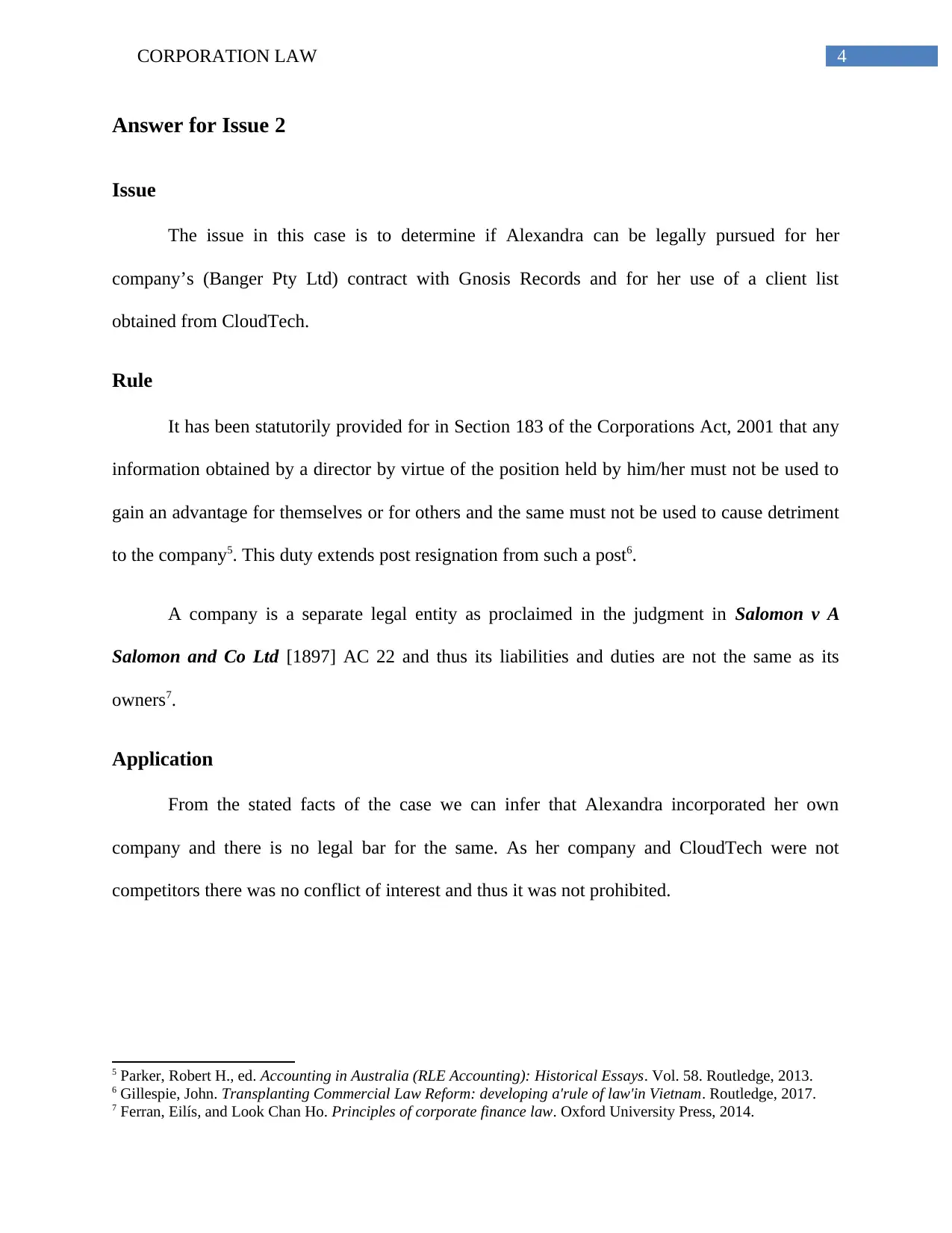
4CORPORATION LAW
Answer for Issue 2
Issue
The issue in this case is to determine if Alexandra can be legally pursued for her
company’s (Banger Pty Ltd) contract with Gnosis Records and for her use of a client list
obtained from CloudTech.
Rule
It has been statutorily provided for in Section 183 of the Corporations Act, 2001 that any
information obtained by a director by virtue of the position held by him/her must not be used to
gain an advantage for themselves or for others and the same must not be used to cause detriment
to the company5. This duty extends post resignation from such a post6.
A company is a separate legal entity as proclaimed in the judgment in Salomon v A
Salomon and Co Ltd [1897] AC 22 and thus its liabilities and duties are not the same as its
owners7.
Application
From the stated facts of the case we can infer that Alexandra incorporated her own
company and there is no legal bar for the same. As her company and CloudTech were not
competitors there was no conflict of interest and thus it was not prohibited.
5 Parker, Robert H., ed. Accounting in Australia (RLE Accounting): Historical Essays. Vol. 58. Routledge, 2013.
6 Gillespie, John. Transplanting Commercial Law Reform: developing a'rule of law'in Vietnam. Routledge, 2017.
7 Ferran, Eilís, and Look Chan Ho. Principles of corporate finance law. Oxford University Press, 2014.
Answer for Issue 2
Issue
The issue in this case is to determine if Alexandra can be legally pursued for her
company’s (Banger Pty Ltd) contract with Gnosis Records and for her use of a client list
obtained from CloudTech.
Rule
It has been statutorily provided for in Section 183 of the Corporations Act, 2001 that any
information obtained by a director by virtue of the position held by him/her must not be used to
gain an advantage for themselves or for others and the same must not be used to cause detriment
to the company5. This duty extends post resignation from such a post6.
A company is a separate legal entity as proclaimed in the judgment in Salomon v A
Salomon and Co Ltd [1897] AC 22 and thus its liabilities and duties are not the same as its
owners7.
Application
From the stated facts of the case we can infer that Alexandra incorporated her own
company and there is no legal bar for the same. As her company and CloudTech were not
competitors there was no conflict of interest and thus it was not prohibited.
5 Parker, Robert H., ed. Accounting in Australia (RLE Accounting): Historical Essays. Vol. 58. Routledge, 2013.
6 Gillespie, John. Transplanting Commercial Law Reform: developing a'rule of law'in Vietnam. Routledge, 2017.
7 Ferran, Eilís, and Look Chan Ho. Principles of corporate finance law. Oxford University Press, 2014.
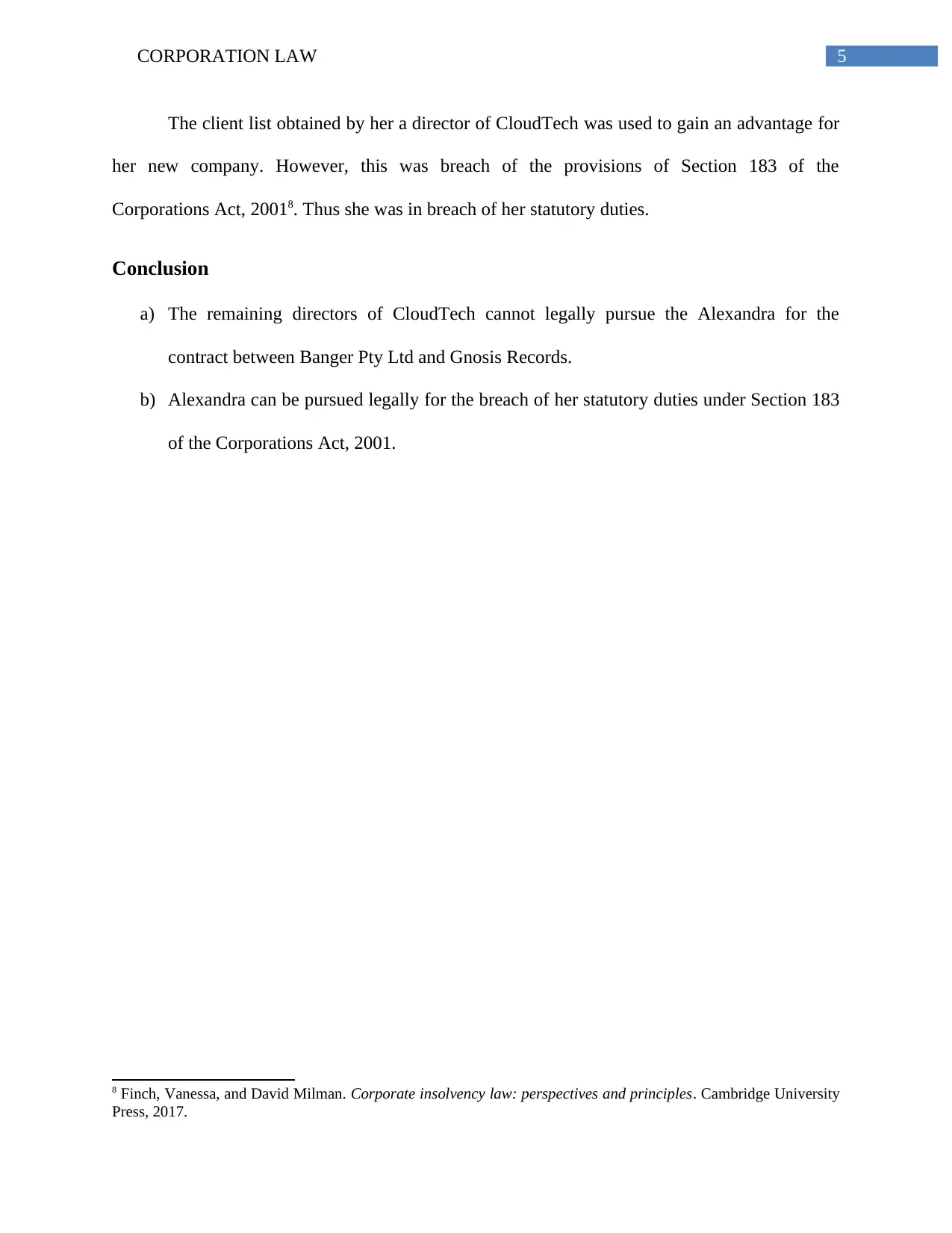
5CORPORATION LAW
The client list obtained by her a director of CloudTech was used to gain an advantage for
her new company. However, this was breach of the provisions of Section 183 of the
Corporations Act, 20018. Thus she was in breach of her statutory duties.
Conclusion
a) The remaining directors of CloudTech cannot legally pursue the Alexandra for the
contract between Banger Pty Ltd and Gnosis Records.
b) Alexandra can be pursued legally for the breach of her statutory duties under Section 183
of the Corporations Act, 2001.
8 Finch, Vanessa, and David Milman. Corporate insolvency law: perspectives and principles. Cambridge University
Press, 2017.
The client list obtained by her a director of CloudTech was used to gain an advantage for
her new company. However, this was breach of the provisions of Section 183 of the
Corporations Act, 20018. Thus she was in breach of her statutory duties.
Conclusion
a) The remaining directors of CloudTech cannot legally pursue the Alexandra for the
contract between Banger Pty Ltd and Gnosis Records.
b) Alexandra can be pursued legally for the breach of her statutory duties under Section 183
of the Corporations Act, 2001.
8 Finch, Vanessa, and David Milman. Corporate insolvency law: perspectives and principles. Cambridge University
Press, 2017.
⊘ This is a preview!⊘
Do you want full access?
Subscribe today to unlock all pages.

Trusted by 1+ million students worldwide
1 out of 6
Related Documents
Your All-in-One AI-Powered Toolkit for Academic Success.
+13062052269
info@desklib.com
Available 24*7 on WhatsApp / Email
![[object Object]](/_next/static/media/star-bottom.7253800d.svg)
Unlock your academic potential
Copyright © 2020–2026 A2Z Services. All Rights Reserved. Developed and managed by ZUCOL.




